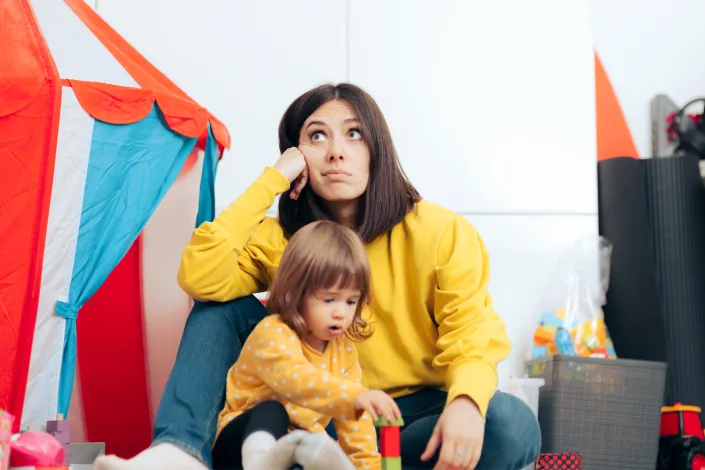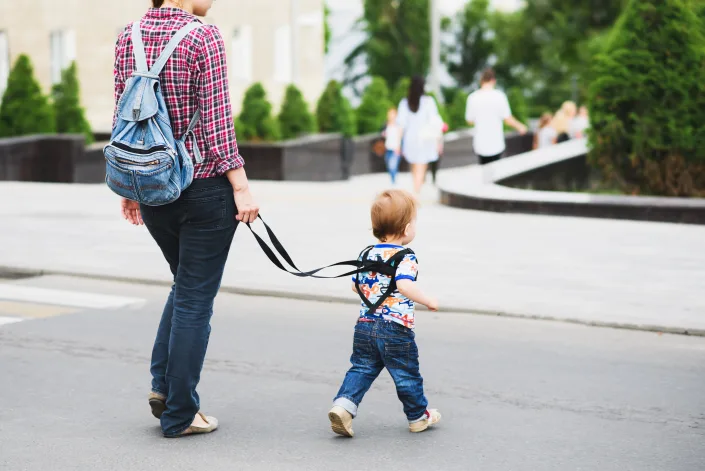Don’t like playing with your kids? You’re not alone. Here’s how to give yourself permission to say “no” to playtime requests.

Parenting is not a one-size-fits-all experience. From first-time parents with no parenting experience to seasoned parents who feel out of their systems, each family unit has a unique understanding of what it means to raise a child in their lives. Nonetheless, in the age of sharing anything and everything on social media, parents often feel defeated, especially when it comes to feeling guilty about playing with their children.
Do parents have to play with their children?
While social media can be a harmful and judgmental place, it also helps parents try to find a balance between their child’s needs and their own. Parents often feel like “entertainment directors” rather than parents when it comes to spending time with their children.
Is it okay not to play with my child? How do parents cope with the inevitable guilt when they don’t play with their children? What can parents do to spend meaningful time with their children if play is not their thing?
Play is important, but so is patience
Tanya Nichols, a clinical psychologist and postdoctoral fellow at the National Center of Excellence for Custodial Children at Vanderbilt University Medical Center, says that while play is important for children, there is a certain amount of flexibility for parents.
“Play is important for processing thoughts and feelings,” she says. “Part of life is knowing there’s something I want, but I can’t always get it right away.” She also says it’s crucial to keep in mind the actual age and developmental age of the child.
“Give kids options to play with,” Nichols said. “Think about what that child needs and consider giving them a time limit to play or telling what they’re doing.” Providing children with play choices can increase their confidence in decision-making while helping them take control of their own entertainment.
It’s OK to say “no” to play
Nichols, who also runs Black Girl Wellness, a subscription-based tool designed to address physical, mental, occupational and financial health issues in the black community, is passionate about mental health.
“In addition to adapting to the needs of the child, parents need to adapt to how they feel,” she says. “Think about what’s realistic for you. Make connections in the day’s daily activities. Have unstructured play on the weekends if that works for your family. Remind yourself that your child needs different things at different points in time. Do what you can to be able to.”
Give yourself a break
Mandee McDonald, a former elementary school teacher and host of the faith-based podcast Known, says she tries to focus on her strengths rather than her weaknesses when it comes to playing with her 6-year-old son. “I love doing crafts, baking and exploring things with my son, but pretending to play is so hard,” she admits. “I try, but he usually tells me I’m doing it wrong.”
McDonald said she relies on her past experiences as a teacher to comfort her whenever she feels terrible mommy guilt. “I just remind myself that independent play is an important skill that kids need to develop early on,” she said. “Keeping him bored and figuring out how to spend his time is really good for his creativity and humility.”
Hillary Ryan, who has four children ages 2 to 11, says she would have “done something wrong” if she didn’t enjoy playing with her children after having four. However, she says, “Like most things in parenting, moderation is key.”
“I love Play-Doh, coloring and building a nice sand castle,” Ryan explains, “I’m always up for a spontaneous pretend tea party, and I’m more than happy to let Hot Wheels soar around the track again and again; but please don’t make me use stuffed animals or Lego people to perform an elaborate scene.”
You are not your child’s entertainer
Jody LeVos, chief learning officer for the educational website Begin, has extensive experience in children’s media and early learning, and he has contributed to the development of several award-winning play-based learning products and experiences. “Parents wear many hats, but our children’s full-time entertainers are not – nor do they need to be – one of them,” LeVos told Yahoo Life. “In fact, there is evidence that boredom is highly valuable, and research shows that unstructured time – when parents aren’t actively directing their children’s activities and entertaining them – is linked to important life skills.”
Ryan confidently affirms that she doesn’t always say “yes” to playing with her kids.
“Maybe it’s because, in addition to my playmate hat, I wear a chef’s hat, a butler’s hat and a housekeeper’s hat,” she says. “Maybe it’s because I have one chapter left in my book and my coffee is still hot. In any case, sometimes I’ll refuse to play, and that’s OK.”
Parents need to give themselves permission to say no. In our current cultural climate, many parents now work from home, and child care is not always available or affordable. Raising children at home can be exhausting for working parents trying to balance everyone’s needs, so teaching children the critical life skill of patience may not always be easy, but it is essential.
How to set playtime boundaries with your child
“Setting boundaries is an important life skill that parents can model for their children,” LeVos explains. She offers some suggestions for setting boundaries appropriately based on the age of the child.
Use a timer to show children a visual representation of when parents are free to play.
Give the child a task or other activity to complete until the parent can interact with them.
Set aside screen time through an educational program that promotes active participation.
So, how do parents show they care about their children if they say “no” to play?
“Showing love to children can take many forms, such as making them feel safe and secure, providing a consistent routine and taking care of their most basic needs,” LeVos says.
Tania Lamb, a mom of five girls ages 9 to 17 who blogs on the parenting and lifestyle website Lola Lambchops, loves doing activities or going places with her kids when they’re young, but she knows she has her limits. “I’m not the mom who goes to the playground on the swings or slides down the slide,” she says.
Lamb added, “I don’t feel any guilt because I don’t think my kids are suffering. I can’t be a source of entertainment, so they’ve learned to play with their siblings or play alone.”
“My husband is the one who practices sports with them and gets dirty with them,” she added. “I love the role he plays with his girls. He loves it, and I don’t, so it’s a perfect doubles combo.”
When it comes to raising children, parents are doing the best they can, and what works for one family may not work for another. It’s important to be willing to be flexible when judging your approach to parenting. And, as Nicholls says, “Do the best you can.”



